Ideas
Arun Shourie: An Intellectual Yodha Or A Hit-Man?
Aravindan Neelakandan
Dec 18, 2024, 12:41 PM | Updated Dec 27, 2024, 09:09 PM IST
Save & read from anywhere!
Bookmark stories for easy access on any device or the Swarajya app.
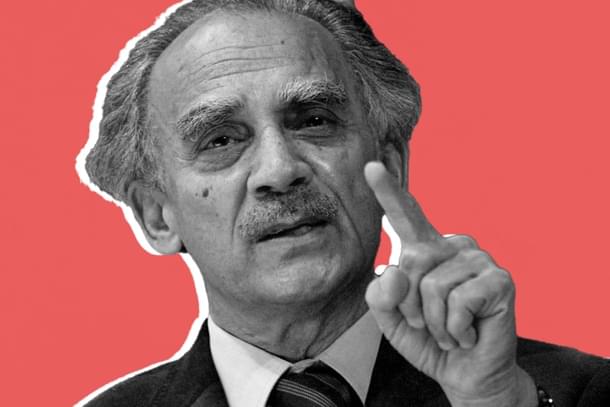
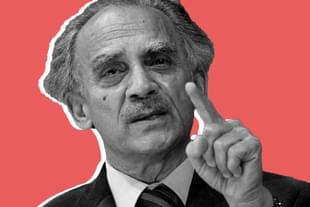
Arun Shourie, the acclaimed writer and intellectual, is poised to release a new book on Veer Savarkar. Judging by the pre-publication publicity, it seems clear this work intends to tarnish Savarkar's image, portraying him in a decidedly negative light.
Shourie, with his characteristic meticulousness, will undoubtedly marshal a convincing array of ‘facts’ to support his argument. But is this a genuine attempt to re-evaluate a complex historical figure, or a calculated exercise in denigration disguised as objective analysis?
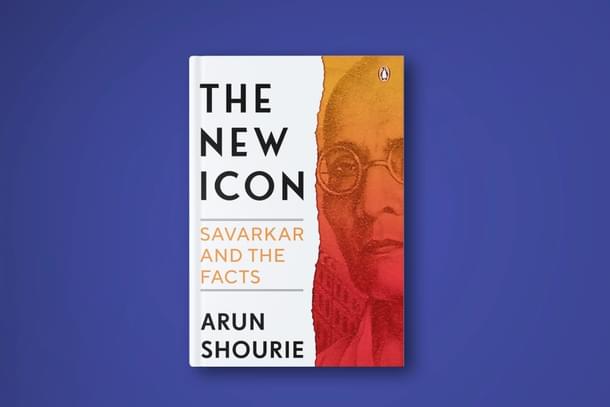
But wait, the discerning reader might interject. Wasn't Arun Shourie a steadfast supporter of the Hindu movement for an extended period?
During the Ayodhya movement, weren't his lectures a resounding wave across the nation? Did he not author books that critically examined the predatory conversion tactics of missionaries?
Did he not unveil the treacherous roles played by Communists during the freedom movement? Did he not expose the systemic stranglehold Marxist academics exerted over the social sciences, particularly history?
Did he not produce a comprehensive and penetrating book on the realm of Fatwas? Did he not contribute to the seminal compilation by Sita Ram Goel, ‘Hindu Temples: What Happened to Them?’ ?
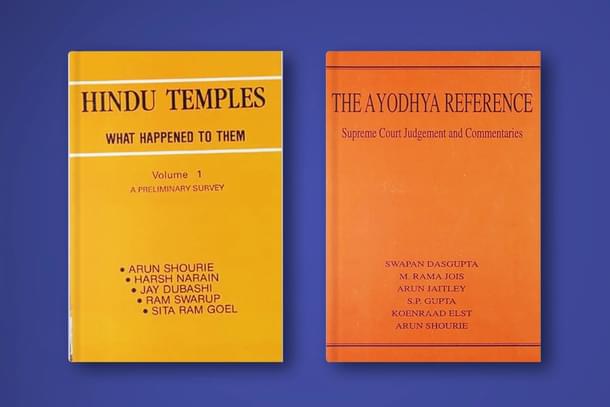
Following the demolition on December 6, 1992, did he not pen a remarkable article for the volume ‘The Ayodhya Reference’ (1995), published by Sita Ram Goel’s ‘Voice of India’?
Was it not his book ‘Harvesting Our Souls,’ replete with empirical data on conversions, that emerged when the Vajpayee Government faced intense scrutiny over alleged attacks on Christians and the Staines murder?
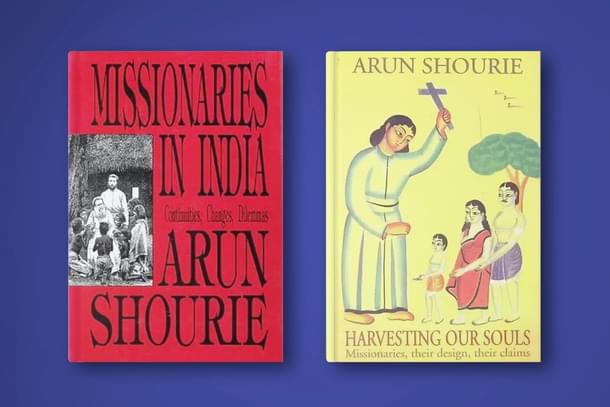
Yes, he did all that. He started aligning with the Hindu movement slowly and tentatively with his articles in the Illustrated Weekly of India when the BJP held merely two seats in the Lok Sabha and any semblance of it being in substantial numbers in the Parliament was lightyears away.
Progressively, he embraced the Hindu cause more and more boldly, remaining steadfast for decades. His contributions are irrefutable, marking a lifelong commitment.
However, it is important to acknowledge that his journey has witnessed a recent estrangement from the movement. While his past allegiance and contributions remain significant, the present situation reflects a shift in his stance.
Arun Shourie's trajectory exposes a fundamental challenge within the Hindu political landscape: the engagement with intellectual supporters of the cause.
Foremost there should be a distinction between an intellectual Yodha and an intellectual hit-man. These are not rigid classifications, for a Yodha may transition into a hit-man, and conversely, a hit-man may ascend to the status of a Yodha.
Yodha or a hit-man?
Sita Ram Goel stands as an exemplar of the Dharmic Yodha, a warrior of the intellect who dedicated his life to the pursuit and defence of Dharma.
With unwavering resolve, he embarked on a mission to rectify historical narratives and illuminate the depths of civilizational history, forever transforming how generations of Hindus perceive their heritage.
Goel's journey was marked by both triumphs and tribulations. Despite experiencing profound disappointments with institutions, he once held in high regard, he remained steadfast in his commitment to core Dharma. His intellectual odyssey, a transition from the confines of communism to the expansive embrace of the Hindu Dharma, serves as a testament to his intellectual integrity and unwavering pursuit of truth.
Arun Shourie is far more academically qualified, far more accomplished in worldly realm of power and popularity than Sita Ram Goel. But he is not an intellectual Yodha. He is an intellectual hit-man. If his demands are not met he would simply move to the other side with all bitterness and destructive zeal.
So to understand the intellectual hit-man phenomenon called Arun Shourie the book one has to start is a book most Hindutvaites may not want to remember. It was one of his earliest books: ‘Hinduism: Essence and Consequence’.
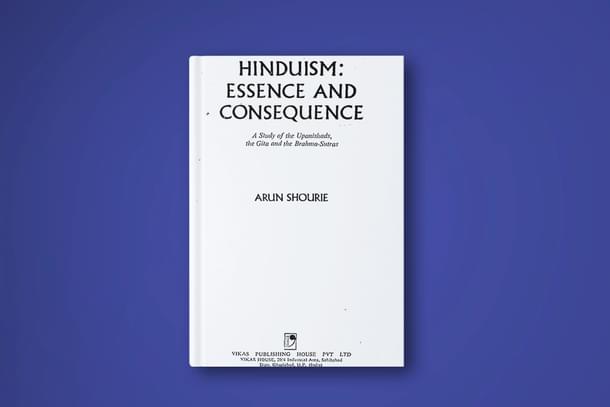
The book, published in 1979, is a sophisticated critique of Hinduism, blaming it for many of India's problems. The criticism, largely from a Marxist perspective, suggests that Hindu spiritual traditions were designed to exploit people. It argues that the philosophical discourse of Hinduism was a cunning creation to extract wealth from the masses for the priestly class and rulers.
Here is a quote from the book:
We are often told that the Hindu tradition exalts man, that it raises him to the level of the Absolute Itself. But ...what is exalted is a disembodied, non-corporal Atman. An abstraction is what is being equated with another abstraction. The empirical man is reviled, ridiculed. His body is abused. His desires are abused. His senses are said to be snares. His mind, his thinking faculties are said to be unruly monkeys among trees, aimless dogs wandering in empty villages. ... Just as the twin aspects of the goal - its transcendental and its exclusive character- breed inertia in the oppressed as far as changing the empirical, man-made world is concerned, it rationalizes callousness in the oppressor. The call to detachment, ..., becomes a cover for sheer disregard for the sufferings of others, vulgar notions of karma are a handy balm for the well-off:... The entire doctrine reflects the deep schism between producers and parasites that seems to have developed as early in our society and that had millennia in which to congeal and harden. Is it all surprising then that the operational implications of the doctrine were precisely the ones that would suit the rulers?
It is important to note that Shourie emerges as an intellectual precursor to the more vehemently anti-Hindu ideologue, Kancha Illaiah. Illaiah extrapolates Shourie's implicit assertions of producers and parasites, mapping them onto Bahujans and Brahmins respectively in a manner reminiscent of how 'Der Stürmer' characterised Jews.
Shourie's writings do not deter such extrapolations; rather, his depiction of Hindu spirituality as a cunningly crafted device for exploitation lends support to Illaiah's views.
But Shourie changed.
Was it genuine or was his antennae so powerful that he understood how the political winds of India had started blowing with the nascent Ayodhya movement starting? Or was it some personal situation and power frustration with his erstwhile leftist PUCL friends? Or sincere change of heart?
It is hard to say.
For such a momentous transformation, there appears to be no article in which Shourie has articulated cerebral journey or the internal alchemy through which this change happened. Considering the deep-seated animosity he displayed towards Hinduism in his book, documentation of his journey in detail, akin to the reflective accounts penned by Sita Ram Goel, would have immensely benefitted his readers.
But he never did that.
However, it's important to differentiate Shourie from Subramanian Swamy, who also aligned with the Hindu movement during Modi's rise but opposed the Ayodhya movement when it happened. Swamy even suggested using the military to take over the Sri Ram Janmabhumi site and hand it over to the Muslims.
In contrast, Shourie remained a steadfast supporter of the Ayodhya movement throughout its duration, standing resolutely with the cause.
Perhaps this transformation can be attributed to a singular influence: Sita Ram Goel.
Drawing from Goel's source materials, Shourie authored ‘The Only Fatherland,’ a scathing critique of the Communists' role during the freedom struggle. Goel's influence is also evident in Shourie's book on missionaries, which Kushwant Singh famously compared to Romans throwing Christians to lions. Shourie openly acknowledged that his book on Fatwas had significant inputs from Arif Muhammad Khan.
In 1997 Shourie published another book that was totally out of sync with the general spirit of the Hindu movement but in the post-Mandal era of caste-polarisation it played to the gallery of ‘upper-castes’.
The book was on Dr. Ambedkar. Provocatively titled ‘Worshiping False Gods’, the book attacks Dr. Ambedkar mostly as pro-British and a self-serving person. The book should have been actually a warning to Hindu side. It showed the tendency of Arun Shourie to mutilate facts and disregard the contexts with the sole object of vilifying a person.
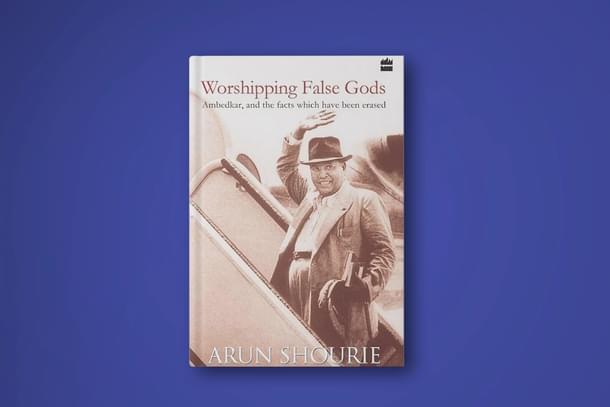
Here is an instance of Shourie’s ‘technology, line and fraud’. The year was 1941. The Second World War was happening. Lord Linlithgow was the Viceroy. The Secretary of State for India was Leopold Stennett Amery. Shourie writes that Ambedkar very much wanted to be part of the Council of Viceroy. But the British knew there was a section within Congress which wanted to side with the British against Hitler. They did not want to offend that group by inducting Dr. Ambedkar. Shourie writes:
At the last minute, therefore, the Viceroy had called Ambedkar and the other aspirant, M.S. Aney, and told them that he would have to put off the expansion of his Council for the time being. Not only that, in view of what he might have to do to win cooperation of the Congress, the Viceroy had had to tell Ambedkar that he could not bind himself or his successor about the future.Worshiping False Gods, p.60
Shourie recounts how the British viewed Ambedkar favourably and how Ambedkar was not entirely supportive of an independent India, claiming Ambedkar's hardships were exaggerated. He laments that these facts have been erased, culminating in Ambedkar receiving the Bharat Ratna.
In reality, caste-Hindus did little to convince Ambedkar of their genuine change of heart. Congress faced resistance passing resolutions against untouchability, and temple entries were contentious. Ambedkar's fears about orthodox elements in Congress were understandable. His biographer, Dhananjay Keer, presented a well-researched and contextual biography. Shourie, however, recycled known facts with rhetorical flourish.
Shourie's main argument is that Dr. Ambedkar was after power and position. He claims that Ambedkar became frustrated when the Secretary of State for India and the Viceroy delayed his appointment. He writes:
A few months later when Ambedkar again did not make it to the Council, the frustration burst through. He urged his case to the Secretary of State — the dejection that was manifest flies in the face of the usual claims that Ambedkar was never keen on posts, just as the grounds on which he pleaded for the post were typical — he wanted the post not for himself but so that the Depressed Classes may be represented!ibid., p.67
This perspective suggests that Dr. Ambedkar used the cause of Scheduled Communities to gain power, driven by a desire for authority and frustration when it wasn't achieved.
But what is the truth? A fierce patriot, Ambedkar’s biographer Dhananjay Keer says the following regarding the same sequence of events:
In the last week of July 1941, the Viceroy expanded his Executive Council by including eight representative Indians and established a Defence Advisory Committee. Ambedkar was appointed, on the Defence Advisory Committee along with Jamnadas Mehta, Ramrao Deshmukh, M. C. Rajah and other well-known Indians and Indian Princes. The Sikhs and the Depressed Classes resented their non-inclusion in the Executive Council. Ambedkar protested against the injustice done to the claims of the Depressed Classes. He sent a cablegram to Amery, the Secretary of State for India, informing him that the non-inclusion of their representative was regarded by them as an outrage and a breach of trust. Savarkar upheld Ambedkar's demand and wired to the Viceroy to include Ambedkar in the Executive Council.Dr. Ambedkar: Life and Missions, pp.338-9
Contrary to Shourie's implication that Ambedkar sought power, Ambedkar was already a member of the prestigious Defence Advisory Committee. He advocated for the representation of the 'Depressed Classes,' and Veer Savarkar proposed his name. The contrast between these factual presentations and Shourie's rhetorical distortions is stark.
When Shourie aims to malign someone, he disregards truth and context, sensationalizing and magnifying his narrative with rhetorical flair. This trait should have been a warning to Hindutvaites, yet they chose to overlook it and promote Shourie.
As Shourie rose in prominence within Hindutva circles, he became a member of Rajya Sabha (the upper house) of Parliament in 1998, representing the BJP.
Shourie's book, ‘Eminent Historians: Their Technology, Their Line, Their Fraud’ (1998), cemented his status as a cult figure among Hindutvaites. This work masterfully combined facts and rhetoric, recharacterizing Hindu traditions he once deemed exploitative as an ‘inclusive religion’ and ‘the pluralist spiritual search of our people and land.’
He now viewed the portrayal of Hinduism as ‘intolerant, narrow-minded, and obscurantist’ as a ‘diabolic inversion.’ To this day, the book remains a valuable resource for understanding the actions of the Marxist cabal when in power.
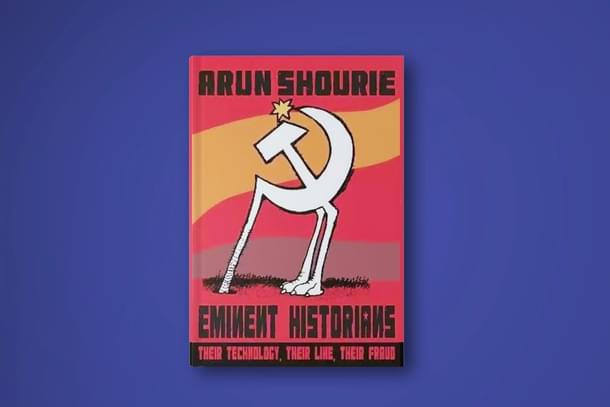
If Shourie's infiltration into the Hindutva political ecosystem was largely facilitated by Atal Bihari Vajpayee his initial stamp of approval was because of his anchoring in the work of Sita Ram Goel. That is despite Sita Ram Goel's visceral hatred for Vajpayee, whom he unjustly and in bad taste called a ‘Nehruvian windbag.’
Between Vajpayee and Advani, it was the latter who was closer to Goel's stance. However, once inside the ecosystem, Shourie clearly made himself closer to Vajpayee. It is unclear if Shourie ever used his proximity to both Vajpayee and Goel to clear any misunderstandings between them. However, it is well documented that in the aftermath of the 2002 riots, Shourie suggested to Vajpayee that he ask Advani to make Narendra Modi resign.
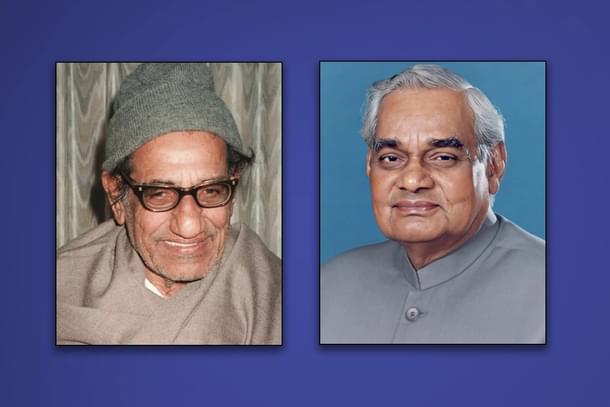
It was not long after the BJP's 2004 election loss, that Arun Shourie turned his attacks on his own party, reserving his harshest criticism for Rajnath Singh. By 2009, he publicly distanced himself from the BJP and his pro-Hindu stance, claiming his loyalty was only to Vajpayee. He then lavished praise on Sonia Gandhi:
In Indian public life there is only one person that I know of who does something conspicuously on the special day for persons with handicaps, that’s Mrs Sonia Gandhi, on Rajiv Gandhi’s birthday, you will always find some photograph of her giving wheelchairs and so on. Why don’t more of us do this? This is a simple thing.
No Hindu temples, no civilizational discourse—it was Vajpayee that kept him in the BJP. Now, he finds Sonia Gandhi the most humane of Indian politicians. He labeled the BJP a “kati patang” (runaway kite), borrowing from a Bollywood movie title, and metaphorically quoted Mao Zedong about bombarding the BJP headquarters. Yet, in 2013, he returned to campaign for Modi within the elite intellectual circles he knew well and thought he was doing a great service to Modi and the BJP.
When in power, Modi did not grant him the powerful cabinet portfolio that Shourie sought, leaving him angry and frustrated. Ironically, he exhibited the same traits he accused Dr. Ambedkar of. He then targeted two revered saints of modern Hinduism, Sri Ramakrishna and Ramana Maharishi attributing their divine experiences to neuropathology, perhaps hoping to provoke Hindutvaites. But most Hindutva responses were in the form of reviews which systematically dissected the book and showed it to be an neither original nor a thorough holistic study, like the Swarajya review here.
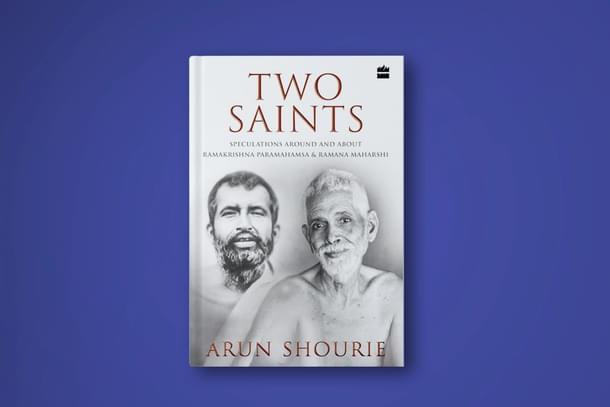
This attempt failed. Despite his absence from social media, he claimed BJP supporters abused his disabled son online. While social media abuse is common, no respectful Hindutva handles targeted his son. Many still respect Shourie, believing Modi might have wronged him.
With his latest book, aimed solely at maligning Veer Savarkar, the illusions of intellectual grandeur, integrity, and honesty that many Hindutvaites hold for Arun Shourie will hopefully be shattered.
Arun Shourie, once seen as an intellectual Yodha, has descended into the realm of an intellectual hit-man. Or perhaps he has always been a hit-man, merely posturing as a Yodha. Yet, Shourie serves as a caution and prayer for every intellectual - whatever his or her ideological persuasion: "Do not lead me to the Shourie fall."





